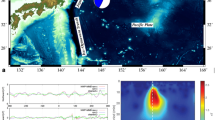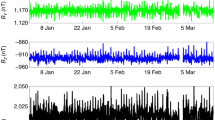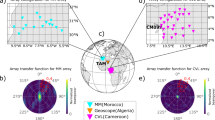Abstract
THE three International Geophysical Year stations operated in the central Pacific by the Scripps Institution of Oceanography have consistently recorded magnetic disturbances following, and apparently caused by, the various nuclear tests conducted by the British in the vicinity of Christmas Island. This fact is particularly interesting because, unlike the American bomb which was exploded in the ionosphere over Johnston Island on August 1, 1958, producing auroral and magnetic effects over a large area of the Pacific1, the British tests are believed to have occurred at relatively low altitudes in the lower atmosphere.
This is a preview of subscription content, access via your institution
Access options
Subscribe to this journal
Receive 51 print issues and online access
$199.00 per year
only $3.90 per issue
Buy this article
- Purchase on Springer Link
- Instant access to full article PDF
Prices may be subject to local taxes which are calculated during checkout
Similar content being viewed by others
References
Cullington, A. L., Nature, 182, 1365 (1958).
Elliot, H., and Quenby, J. J., Nature, 183, 810 (1959).
Author information
Authors and Affiliations
Rights and permissions
About this article
Cite this article
MASON, R., VITOUSEK, M. Some Geomagnetic Phenomena associated with Nuclear Explosions. Nature 184, BA52–BA54 (1959). https://doi.org/10.1038/184052a0b
Issue Date:
DOI: https://doi.org/10.1038/184052a0b
This article is cited by
Comments
By submitting a comment you agree to abide by our Terms and Community Guidelines. If you find something abusive or that does not comply with our terms or guidelines please flag it as inappropriate.



